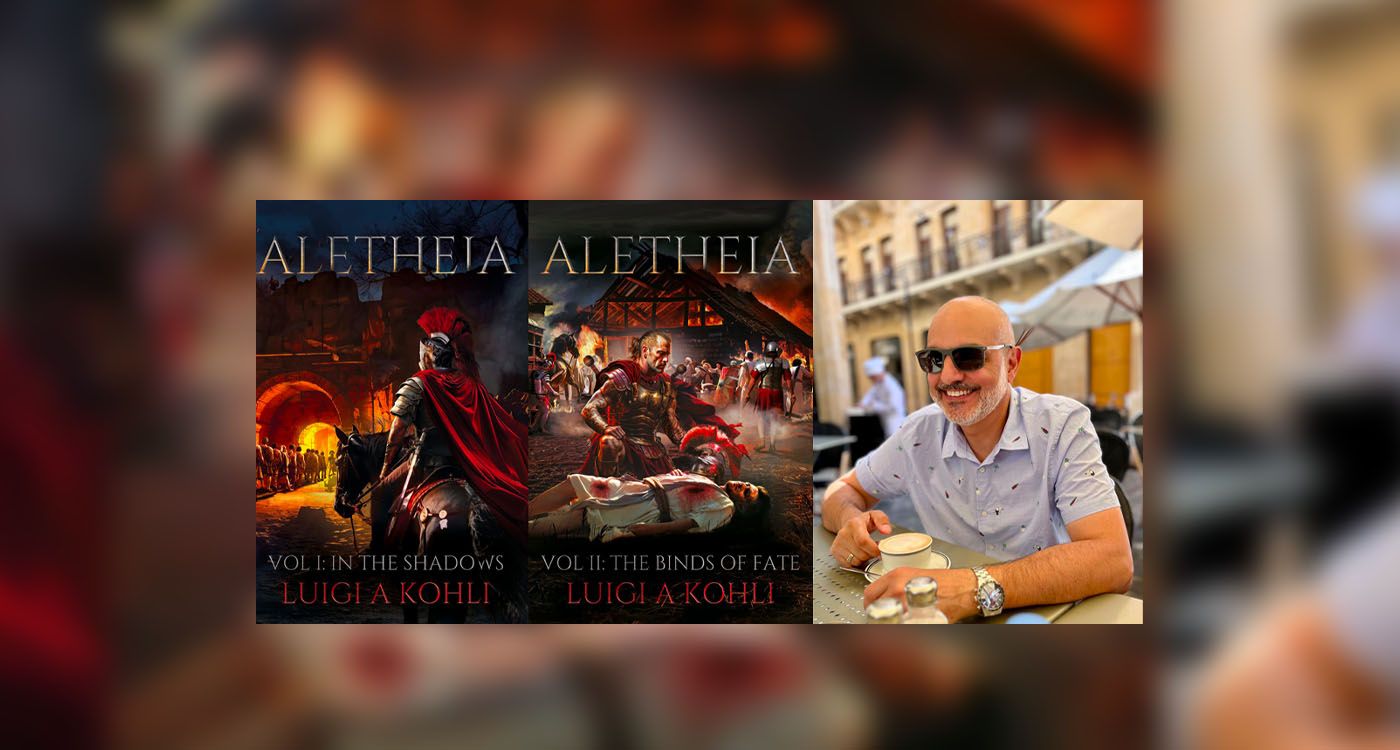
Luigi A. Kohli, author of Aletheia, a Ben-Hur saga, left the corporate world to pursue a lifelong passion for storytelling. Inspired by epic cinema and ancient history, he reimagines the Ben-Hur legacy with bold vision and historical depth. In this exclusive interview with This is Beirut, he shares the journey behind the saga.
Luigi A. Kohli, author of Aletheia, a Ben-Hur saga, followed a dream that never left him. After years in the corporate world, he found the courage to step away and embrace the calling he had carried since youth: to write. What began as a long-held fascination with epic films and ancient history transformed into a powerful, imaginative continuation of the Ben-Hur legacy. Thus, Aletheia, a Ben-Hur saga, was born. Blending historical depth with narrative flair, Kohli brings a fresh voice to a timeless story. In this conversation with This is Beirut, he shares the journey, inspiration and vision behind the saga.
Exiled in Parthia, Justus Pilate lives in the shadow of a shattered past as his once-powerful family has been destroyed and the woman he loved is believed to have died a hero. The keys to his freedom lie within reach, yet he dares not use them, knowing they come with a terrible curse. Everything changes when a message arrives: his brother Cassius is alive. But Cassius is no longer the man he was, consumed instead by vengeance and rage that threaten to ignite a new and rising faith, one destined to shape the world through fire and blood. As prophecy looms and the stakes rise, Justus is drawn into a struggle far greater than he ever imagined, where the fate of his brother and the course of history hang in the balance.
Interview with Luigi A. Kohli
How did you get started with the adventure of writing Journey?
My first career after graduation was as a technical writer, writing training manuals and other technical materials. But ever since I was a teenager, I had a passion for fiction, especially classic Hollywood epics from the 1950s and 1960s. Those films fascinated me because they were rooted in history, yet felt like fantasy. Stories like Ben-Hur, The Ten Commandments or Quo Vadis seemed like tales from another world, yet they were inspired by real events. Ben-Hur has always been my favorite movie.
Even though my professional life took a different path — in technical writing and business — I never lost that creative desire. At 57, I left the corporate world to finally pursue the story that had lived in me since my youth. I wanted to continue the Ben-Hur narrative. What happens next? That’s what inspired me to start writing. Once I began, I also fell in love with the process: the research, the plot construction and developing the characters.
Who is your audience, in your opinion?
I don’t think there’s a specific age or gender. My story is for anyone who loves history, especially when it’s told within a compelling narrative. It’s about learning something from the past, but through the lens of storytelling.
What was the writing process you adopted as you mixed fiction and reality?
I’m not sure there’s a right or wrong way to do it. I began with the end in mind. My goal was to write a story that, if Lew Wallace, the original author of Ben-Hur, were alive, he’d feel was a worthy continuation. The original story is told from the perspective of a Jewish prince. I wanted to offer a twist, telling the next part from a Roman point of view.
I had two big questions that drove my ending: First, what happened to Pontius Pilate? Second, why did Christianity survive when so many other religions and prophets didn’t?
These questions shaped my narrative. I let them guide me, and then I used historical research from that time period to build a bridge between fiction and reality. It became a creative journey. I had the destination, but not the map. The plot unfolded step by step, almost like pieces of science fiction stitched into a historical epic.
What inspires you now as a writer? And who does?
The entire process inspired me. It felt like I opened a door inside myself that had always been there, but I’d never walked through it. There’s a saying that everyone has a book inside them, and I believe it. Whether the book is good or not is for others to judge, but for me, the joy was in the process.
If I had to credit someone with helping me believe in myself, it would be Stephen King. Not for his fiction necessarily, but for his book On Writing. Although his genre is way too different than mine, this book in particular taught me to trust my imagination. He described writing as an archaeological dig: you start with the end in mind, then you get to scorching around the edges, and slowly the story reveals itself. I didn’t believe it at first… but he was absolutely right.
Do you nurture another idea for a new book, or do you believe stories will come naturally with life?
Now that I’ve started writing, I’m always on the lookout for my next story. The current book I wrote is actually one long story, but I divided it into two volumes. That’s done now, and I’ve already started working on a third book in the series.
After that, I would like to shift into something different in the science fiction genre. I go to the movies a lot and read extensively, and I always keep my mind open for new ideas. So, after the third book, I’m excited to begin a brand-new sci-fi project. I already have the idea in mind.
What is your message to young aspiring writers?
Have a goal. Believe in your creativity. That’s the most important thing. Especially today, when young people are so influenced by social media and distracted by other careers and trends, it’s easy to forget about writing. However, if storytelling is something you’re passionate about, pursue it. Set a goal. You’ll be surprised at the results.
What is your motto in life?
The glass is always half full. I know it might sound a bit cliché, but it’s true. A positive attitude makes all the difference.
You mentioned research. How did real historical events influence your story?
Many parts of the story are inspired by actual historical findings from the region. For example, there's a legend that archaeologists in the city of Tyre found the remains of Pontius Pilate’s wife. That sparked a creative idea: How would she have ended up there? In the book, I built a fictional explanation for that. There are several moments like this in the story; real events and discoveries that I used as the foundation for imaginative storytelling.
How does it feel to be an independent author ?
Being an independent author gives you full control over the whole process, and it is a bit like starting a business. Once you have the product, you have to consider testing marketing, sales, distribution, et cetera — all within a budget that you need to manage. That’s what the entrepreneurial spirit is all about! It’s a fantastic time to be an independent author, as it feels amazing to have the opportunity to share my story with readers around the world. I’m grateful for the chance to bring these characters and this journey to life.
Check out Luigi A. Kohli’s official website to explore his books.




Comments